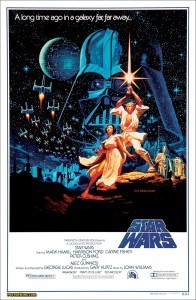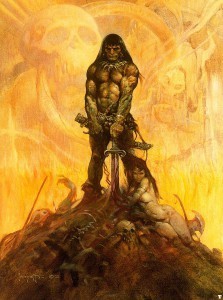Sword up vs. sword down
To general readers (i.e., those who don’t read one genre exclusively), “fantasy” means warriors, sorcerers, castles and dragons. The omnipresence of Joseph Campbell, in the wake of George Lucas, has added the core story idea of the naive young hero, sword raised as a beacon of everything that’s just and right, preparing to go into battle. You can see the quintessential image of this on the original Star Wars poster.

Artwork by the brothers Hildebrandt
The concept itself, though, probably goes back to King Arthur pulling the sword from the stone and to whatever prior folklore inspired it.
It’s certainly a primal idea. The sword aloft symbolizes courage, justice, and all the other positive aspects of a might-makes-right feudal society. Modern readers like it because it tells us that the person holding the sword, whether the unaware bastard son of a king or the farmboy who’s the new hope of the galaxy, has the kind of moral compass that will always guide that sword to the right mark. It points (no pun intended) toward a glorious future.
And yet, there’s an opposite idea that’s almost as powerful. And to me at least, a whole lot more interesting.
It’s the image of the warrior after the battle, sword down, surrounded by the bodies of the dead. He’s not young; often he’s depicted visually as grizzled and scarred. Far from being naive, he’s gifted with knowledge most of us would never want to acquire. He knows the cost of victory.

Conan, by Frank Frazetta.
As a writer, I find this image much more compelling, because it has dramatic depth. It carries its own history. Perhaps it’s because I’m middle-aged myself, but the idea of the naive young hero setting out on his adventures isn’t nearly as interesting as the battered semi-hero struggling to both defeat his enemies and hang onto his morals. (interestingly, that’s also a fair description of the classic private eye).
As youngsters first discovering fantasy, we respond to the figure closest to ourselves. We like the idea of the “average” kid being plucked from obscurity by a destiny s/he never knew existed: King Arthur, Luke Skywalker, Jim Hawkins, Lessa of Pern. It’s something we all hope also happens to us. But as adults, we recognize both the shallowness and the short shelf-life of such a character. We’ve seen real life tarnish the armor of too many ersatz shining knights.
Now, I’m not saying adults don’t enjoy Luke Skywalker, or that younger readers don’t appreciate Conan. Both are perfectly valid character archetypes. But I do think we appreciate them differently at different stages of our lives. It’s what makes fantasy so much fun to read, and to write.
At this stage of my own life, I’m still living them both. I read Treasure Island to my sons, and see them mentally and emotionally identify with Jim Hawkins. At the same time I enjoy books by my peers that deal with bitter, slightly shady characters struggling with their pasts, such as Kelly McCullough’s Broken Blade and Douglas Hulick’s Among Thieves. And of course I have my own Eddie LaCrosse, who has plenty of baggage of his own.
Who are your favorite stalwart young heroes (in the genderless sense of the word), and your favorite ones over thirty?



